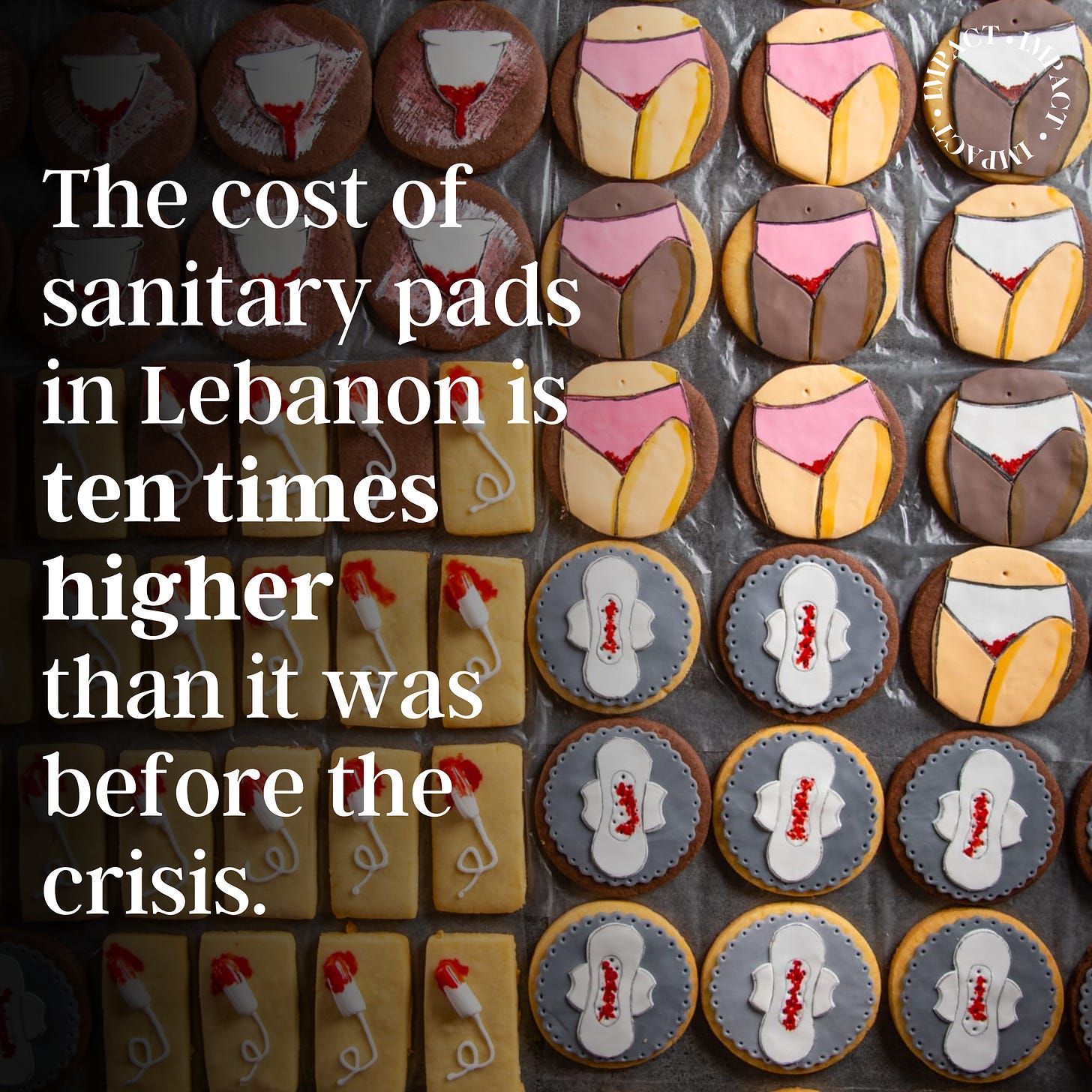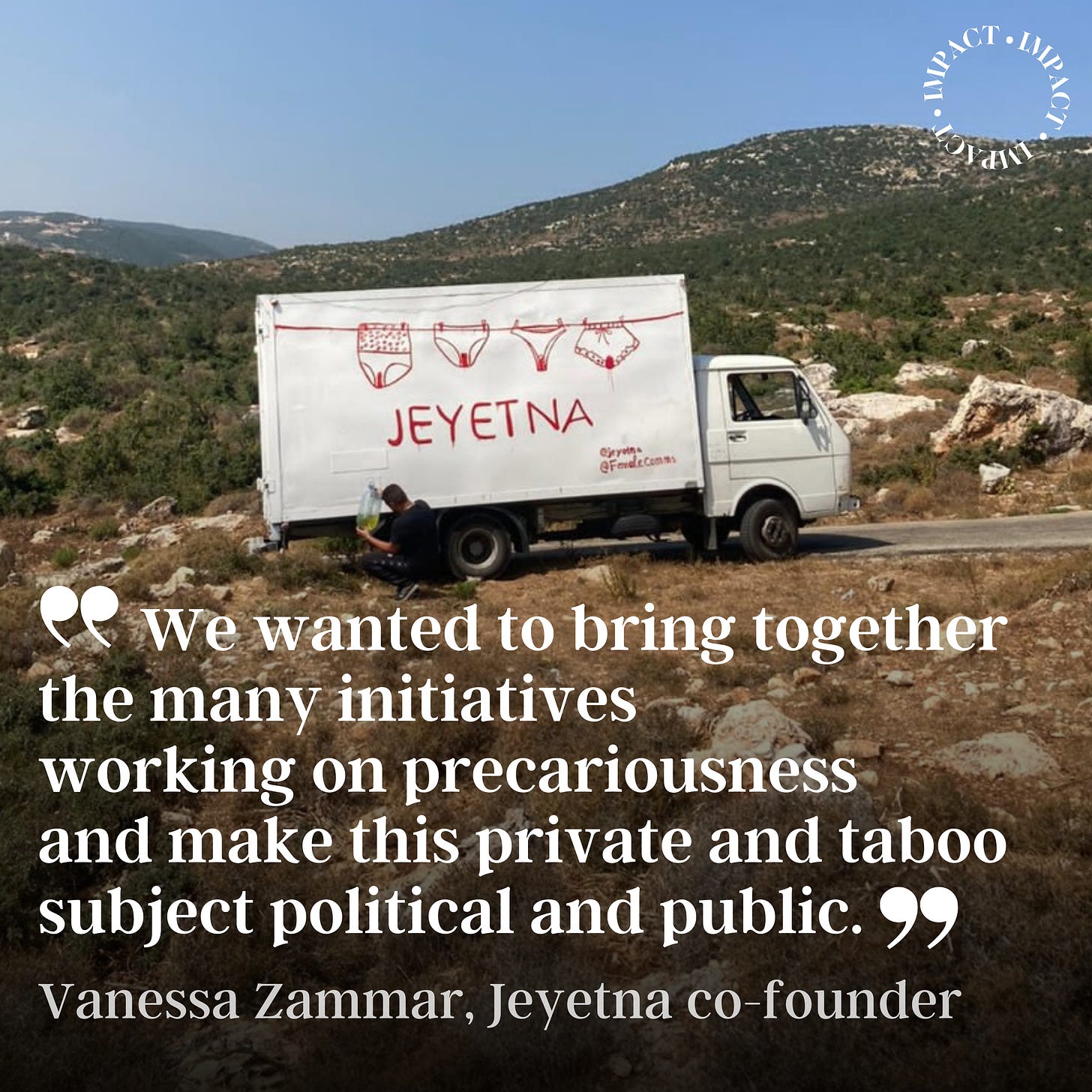“Patriarchy and corruption”: Lebanon’s feminists take on cascading crises
They’re on their « last legs », but they’re still standing
- 🇱🇧 Plunged into one of the world’s worst economic crises, 80% of the Lebanese population lives in poverty. And women are hit hardest.
- ❗Since October 7, war on the southern border has made a national crisis ever more complex.
- ✊🏽 Despite the exhaustion, the country’s feminists continue to fight to improve the lives of women and LGBTQIA+ people.
If you want to be up-to-date on feminism worldwide, follow us on LinkedIn and Instagram.
Parlez-vous français ? Impact is also available in French:
By Marine Caleb
Since 2020, Lebanon has been paralysed by one of the world’s worst economic crises, a product of widespread corruption and rampant inflation. Today, more than 80% of the population lives in poverty.
If life continues against this dire backdrop, for many Lebanese people, it is becoming ever more precarious. The COVID-19 pandemic, the giant explosion in the port of Beirut that devastated the city in 2020 and the sharpening economic crisis driven by the war in Ukraine have left a population exhausted and living on the edge. Feminists are no exception.
“After four years of crisis, we’re on our last legs. Mental health, stress, it’s not easy,” says Vanessa Zammar, the co-founder of Jeyetna, a period poverty initiative in the country.
Then came October 7th, and the subsequent war in Gaza. Some 600 kilometres to the north, on Israel’s border with Lebanon, another front is being fought between the Israeli army and the Lebanese group Hezbollah. In southern Lebanon, 55,000 people have been displaced by the fighting, according to the International Organisation for Migration. The escalation has left Lebanese people paralysed by anticipation and fear of a conflict further plunging the country into ever-deeper crisis.
In response to the war, feminist movements have organised or joined marches in support of the Palestinian people. The feminist group Wing Women Lebanon sent 5,750 reusable pads and diapers to Gazan women and children after Palestinian journalist Bisan Owda raised the alarm about the menstrual crisis and other hygiene problems suffered by women in Gaza.
“We write, we publish, we talk about it, we take part in demonstrations organised by other groups, we mobilise our public”, explains Jana Nakhal, a doctoral student in urban planning and a feminist activist who is a member of the World March of Women.
“On our social networks, we have created a series of infographics to explain the war from a feminist perspective. We look at the consequences of colonialism and war on food sovereignty, fertility, land and the health system,” she says.

Fighting patriarchy and corruption with feminism
The war is just the latest front on which feminists are organising despite the intense difficulty of daily life in Lebanon.
Already unequal before the crisis, the situation of women in Lebanon has only worsened. They are the first to lose their jobs (75% of women of working age are unemployed), the first to experience food insecurity and the first to be forced out of education. Exposure to sexual and gender-based violence is increasing. Advocates say the most vulnerable women are worst affected, including refugees, migrant workers and women with disabilities.
For many, menstruation has become a luxury. In 2021, with the country mired in crisis, the government decided to subsidise 300 basic essentials. These included men’s razors, but not tampons or sanitary towels. As a result of inflation and currency devaluation, women now have to pay up to ten times more than they used to for a pack of sanitary towels. In 2021, two-thirds of women and girls in Lebanon could not afford menstrual products, according to a study by the charity Plan International and Fe-Male, a Lebanese feminist organisation.
“We wanted to bring together the many initiatives working on precariousness and make this private and taboo subject political and public,” Zammar says.
Today, Jeyetna volunteers travel around Lebanon distributing menstrual products and tackling the lack of information, safe spaces and clean, private bathrooms for people who menstruate.
“Patriarchy and corruption mean these issues are not a priority,” says Lina Abou-Habib, an activist, feminist researcher and director of the Asfari Institute for Civil Society and Citizenship.
Abou-Habib says the new wave of feminist activists “tackle inequalities by being more inclusive.”
She includes groups like Jeyetna in this assessment, but also migrant women’s groups such as the Anti-Racism Movement, LGBTQIA+ groups such as the Yalla Care Coalition, and the health clinics that advocate for sexual and reproductive rights. “They attack the intersectional sources of the crisis,” Abou-Habib says.

Activism in crisis
Amid the cascading crises, many feminist organisations have struggled to keep going. Zammar says the economic situation is forcing her activist friends to combine several jobs with activism: “That means very long days and a six-day working week. We don’t have time to get together.”
Meanwhile, government intimidation is forcing some feminists into silence.
“Many factors have contributed to the disappearance of certain types of action,” Abou-Habib says. “The influence of Interior Minister Bassam Mawlawi, who speaks out freely against the queer community and women, plays a big role, because it makes it dangerous to protest.”
Yet despite Lebanon’s many challenges and the looming threat of war, feminists continue to share a need to work together.
Faced with an absent state, they remain motivated to act, often on a voluntary basis, because without them, many women and girls would have no support at all.